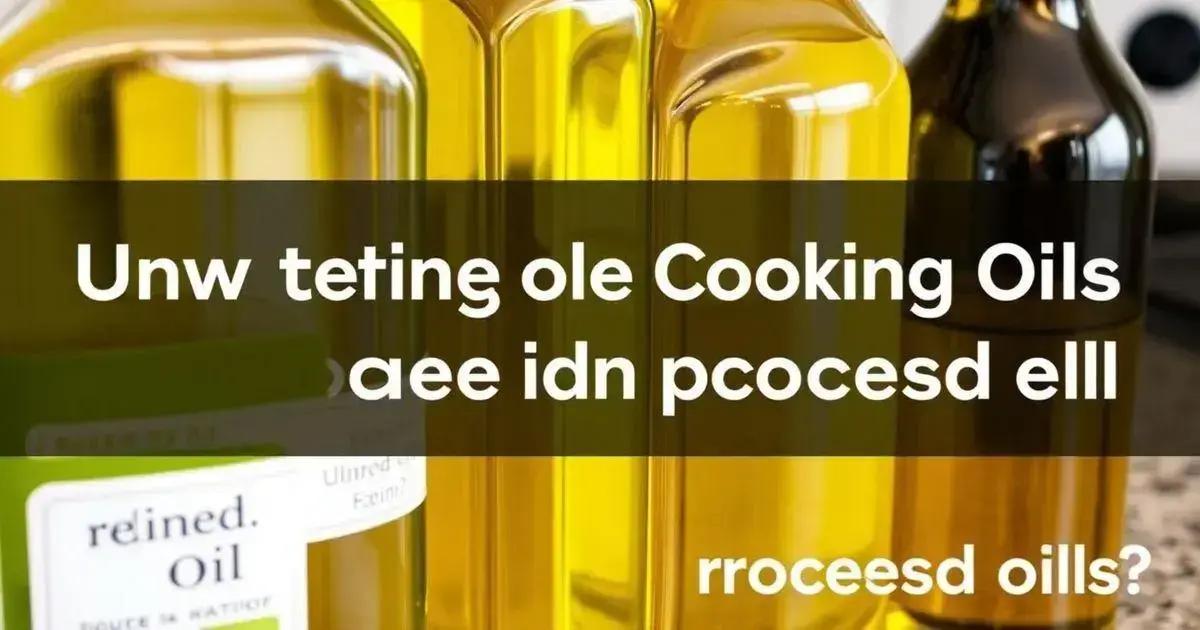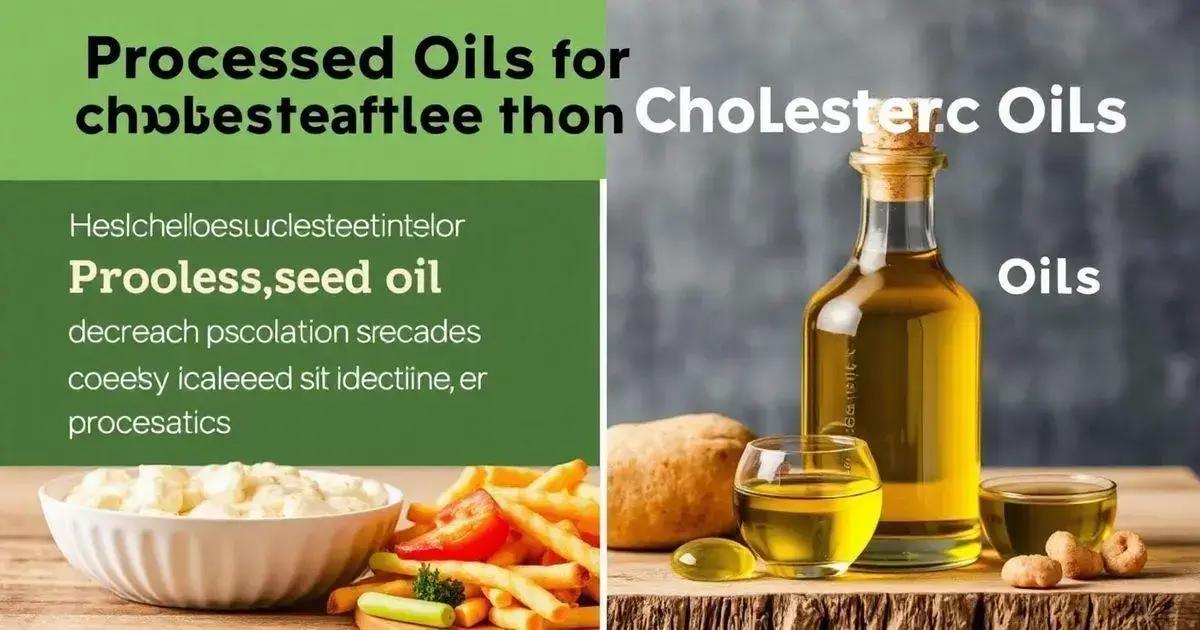To avoid processed oils and improve cholesterol levels, focus on reading labels to identify unhealthy fats, cooking at home with healthy alternatives like extra virgin olive oil, and choosing whole foods while limiting processed snacks and fast foods.
Maintaining healthy cholesterol levels is crucial for heart health, and one effective way to achieve this is by avoiding processed oils. Processed oils can negatively impact your cholesterol and overall well-being. In this article, we will delve into what processed oils are, their effects on cholesterol levels, and practical alternatives that can enhance your diet. Let’s explore how simple dietary changes can lead to better heart health.
Understanding Processed Oils

Processed oils are oils that have been refined and chemically altered for commercial purposes. Common examples include soybean oil, canola oil, and corn oil. These oils are often used in processed foods and fast foods due to their low cost and high stability for frying.
Many processed oils undergo a complex refining process that may include bleaching and deodorizing. This process removes impurities but can also strip away valuable nutrients. Additionally, some oils contain trans fats, which are known to raise bad cholesterol levels (LDL) while lowering good cholesterol (HDL).
Why Are Processed Oils Popular?
Processed oils are prevalent in the food industry because they are inexpensive to produce and can improve the flavor and shelf life of products. However, relying heavily on these oils can lead to health problems, particularly related to cholesterol levels.
How to Identify Processed Oils
To avoid processed oils, it is important to read food labels carefully. Look for terms like hydrogenated or partially hydrogenated, which indicate the presence of unhealthy trans fats. Choosing whole, unprocessed foods as part of your diet can help you steer clear of these oils.
In summary, understanding what processed oils are and their effects on your health is the first step towards making informed dietary choices that support better cholesterol levels.
The Impact of Processed Oils on Cholesterol

The impact of processed oils on your cholesterol levels can be significant. Many commercially available oils are high in trans fats and omega-6 fatty acids, which can disrupt the balance of cholesterol in your body. High levels of bad cholesterol (LDL) and low levels of good cholesterol (HDL) are linked to heart disease and other health issues.
How Processed Oils Affect Cholesterol
When you consume processed oils, the trans fats they contain can increase your bad cholesterol levels. Trans fats are often found in partially hydrogenated oils. These fats not only raise LDL cholesterol but also lower HDL cholesterol, which is crucial for heart health.
The Role of Omega-6 Fatty Acids
Processed oils typically contain high amounts of omega-6 fatty acids, which, in excess, may promote inflammation in the body. While omega-6 fats are essential for health, the typical Western diet often has a disproportionate ratio of omega-6 to omega-3 fatty acids, leading to adverse effects on cholesterol levels.
Research Findings
Numerous studies have shown that diets rich in processed oils can negatively impact cholesterol levels. For instance, research indicates that people who consume high amounts of trans fats and processed oils have a higher risk of developing cardiovascular diseases. Replacing these oils with healthier options can help maintain better cholesterol levels.
Being aware of the impact processed oils have on your cholesterol enables you to make healthier food choices that promote better heart health.
Healthy Alternatives to Processed Oils

Finding healthy alternatives to processed oils is essential for improving cholesterol levels and overall health. Here are some great options to consider:
1. Extra Virgin Olive Oil
Extra virgin olive oil is rich in monounsaturated fats, which can help lower bad cholesterol (LDL) while raising good cholesterol (HDL). It also contains antioxidants that protect the heart.
2. Avocado Oil
Avocado oil is another excellent choice. It has a high smoke point, making it perfect for cooking, and is rich in heart-healthy fats. Additionally, it is full of vitamins and minerals beneficial for overall health.
3. Coconut Oil
Coconut oil is a popular alternative that contains medium-chain triglycerides (MCTs). While it may raise cholesterol levels slightly, it can also promote heart health when used in moderation. Be sure to balance it with other healthy fats.
4. Nut and Seed Oils
Explore options like almond oil or flaxseed oil. These oils provide essential fatty acids and often come with unique flavors. Flaxseed oil, in particular, contains omega-3 fatty acids, which are great for heart health.
5. Sesame Oil
Sesame oil is not only flavorful but also offers beneficial compounds like sesamin, which can improve cholesterol levels. Use it in dressings or drizzling over dishes.
Switching to these healthy oil alternatives can help support better cholesterol levels and contribute to an overall healthier lifestyle. Include them as part of a balanced diet for heart health.
Practical Tips for Avoiding Processed Oils

Avoiding processed oils in your diet is vital for better cholesterol levels. Here are some practical tips to help you steer clear of these oils:
1. Read Labels Carefully
When shopping for groceries, always check ingredient labels. Look for terms like hydrogenated or partially hydrogenated oils, which indicate the presence of unhealthy trans fats. Choose products that use healthy oils instead.
2. Cook at Home
Cooking at home gives you control over the ingredients you use. Opt for healthy oils like extra virgin olive oil or avocado oil when cooking. Preparing meals from scratch helps you avoid processed foods that often contain harmful oils.
3. Choose Whole Foods
Incorporate more whole foods into your diet, such as fruits, vegetables, nuts, and whole grains. These foods are naturally free of processed oils and provide essential nutrients for your health.
4. Be Cautious with Salad Dressings
Many store-bought salad dressings contain processed oils. Make your own dressings using healthy oils, vinegar, and herbs for flavor. This way, you avoid chemicals and unhealthy fats.
5. Limit Fast Food and Processed Snacks
Processed snacks and fast food are often high in unhealthy oils. Try to limit your intake and instead choose healthier snacks like fresh fruits, vegetable sticks, or homemade snacks. If you must eat out, choose restaurants that focus on fresh, whole ingredients.
6. Use Oils Wisely
Use oils sparingly in your cooking. Using less oil can minimize your intake of processed varieties. Consider using non-stick cookware to reduce the need for added oils.
Implementing these practical tips can help you significantly cut down on processed oils and support better cholesterol levels.
In Summary, Choosing Healthier Options Matters
Avoiding processed oils is essential for maintaining better cholesterol levels and overall heart health. By understanding what processed oils are and how they impact cholesterol, you can make informed dietary choices.
Switching to healthy alternatives like extra virgin olive oil and avocado oil, along with practical tips for avoiding processed oils, will empower you to take control of your health. Remember to read labels, cook at home, and choose whole foods to minimize your intake of harmful fats.
Small changes in your diet can lead to significant improvements in your cholesterol levels and overall well-being. Embrace these healthier choices to foster a heart-healthy lifestyle.
FAQ – Frequently Asked Questions About Avoiding Processed Oils
Why should I avoid processed oils?
Processed oils can negatively impact your cholesterol levels and overall heart health. They often contain unhealthy trans fats that raise bad cholesterol and lower good cholesterol.
What are some healthy alternatives to processed oils?
Healthy alternatives include extra virgin olive oil, avocado oil, coconut oil, and nut or seed oils like almond oil and flaxseed oil.
How can I identify processed oils in food products?
Check ingredient labels for terms like ‘hydrogenated’ or ‘partially hydrogenated oils.’ These indicate unhealthy trans fats and processed oils.
What are simple ways to avoid processed oils in my diet?
Read labels, cook at home using healthy oils, focus on whole foods, make your own dressings, and limit fast food consumption.
Is it okay to use processed oils in moderation?
While using them in moderation might not be harmful for everyone, it’s best to avoid them as much as possible to promote better health outcomes.
Can switching to healthy oils improve my cholesterol levels?
Yes, using healthy oils can help lower bad cholesterol (LDL) and raise good cholesterol (HDL), contributing to improved heart health.












